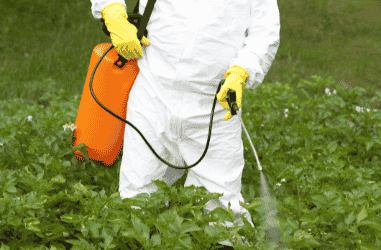What Is Paraquat Used For?

Paraquat is mainly used as a nonselective herbicide. It works by inhibiting the activity of photosynthesis in weeds or any unwanted plant, which causes them to die. Paraquat is considered one of the most toxic chemicals known to man, so its usage is highly restricted. It is commonly used in agriculture, forestry, and rangeland to control weeds. The herbicide is also used on a smaller scale for other purposes, including weed control in areas like roadsides and pastures.
Many people are exposed to Paraquat because it is often handled without taking proper precautions. Paraquat causes severe poisoning and even death if it comes into contact with skin, eyes, or lungs. The chemical is also harmful if swallowed. Ingestion can occur accidentally if someone eats food that has been sprayed with Paraquat. Additionally, ingestion may occur intentionally if someone tries to commit suicide using Paraquat.
Most accidental poisonings involving Paraquat occur after its use as an insecticide or an herbicide. When you or your loved one has had Paraquat poisoning, especially through someone else’s fault, a paraquat lawsuit lawyer can help. Lawyers in our network can help you pursue fair compensation as you navigate the recovery process.
What is Paraquat Herbicide?
Paraquat is used in agriculture primarily as a broad-spectrum herbicide to kill weeds and other unwanted plants. It’s most commonly used in land clearing for farming or ranching purposes. Paraquat is a chemical herbicide (weed killer) used to kill weeds in agricultural fields and areas like roadsides and pastures.
Paraquat can also be used for non-agricultural purposes to eliminate invasive species found in certain ecosystems. When applied to crops, it works by binding to the same neurotransmitters that insects affect. This causes the plants to die very quickly. As such, farmers can use this tool to clear large fields in a short amount of time with only one application (and no further maintenance).
What is Paraquat Used For?
As mentioned before, Paraquat is used primarily as an herbicide, so it is used to kill unwanted plants such as weeds and invasive species. In addition, it can be used to clear land for farming or ranching purposes.
It’s also sometimes used to kill non-native plants in certain ecosystems, such as Marijuana. These applications are generally considered less common than the agricultural uses of Paraquat.
When applied, Paraquat binds to the same neurotransmitters that control movement in insects. As a result, it disrupts the ability of the plant to conduct normal cellular processes and eventually leads to death. The herbicide works by inhibiting a certain enzyme called acetolactate synthase (ALS), thereby preventing the production of the amino acid L-arabinose. This prevents the growth of plants that produce this amino acid, including many broad-leaf weeds. Experts believe that the compound may interfere with the metabolism of cells in some way.
What You Need to Know About Paraquat and Parkinson’s Disease
According to Science Direct, there is a significant correlation between Paraquat and Parkinson’s disease. Paraquat is a broad-spectrum chemical that affects the human nervous system by attacking dopamine-producing neurons in the substantia nigra (part of the brain). Paraquat acts on the nigrostriatal pathway, which controls voluntary movement and posture. This pathway originates in the midbrain and connects to the striatum at the base of the forebrain. The dopamine neurons of this pathway are responsible for initiating motor movements such as walking, running, or jumping.
Paraquat also affects other parts of the brain, such as structures in the frontal lobes that control moods and emotions and structures in the hypothalamus that control sleep and wakefulness. These brain parts are all directly connected to dopamine neurons through pathways originating in midbrain areas (substantia nigra).
Paraquat damages cell bodies, which causes degeneration or death of cells resulting in Parkinson’s Disease symptoms. Parkinson’s disease is characterized by tremors, stiffness, and slowness of movement. These symptoms may be caused by the loss of nerve cells within certain brain parts, including those that control voluntary movement. The cause(s) of Parkinson’s Disease has been a mystery until recently when scientists discovered that pesticides like Paraquat were causing damage to nerve cells within specific areas of our brains called “neurons.” There are several types of neurons that control different functions in the brain. These include:
- Motor neurons (which are associated with voluntary movement)
- Sensory neurons (which detect stimuli such as touch, sound, smell, and taste)
- Nervous system neurons (which regulate internal body processes such as breathing and heart rate)
Neurotransmitters are chemicals that transmit messages from one nerve cell to another. Their job is to allow a nervous system neuron to communicate with another. For example, when you eat a favorite food, a neurotransmitter called dopamine is released from the brain, sending the message that you like it, causing a rush of comfort, pleasure, and stored memories of past times enjoying it. But that’s not all dopamine does.
Dopamine is an important neurotransmitter that transmits messages between nerve cells. After being released by a nerve cell, dopamine travels along the synaptic pathways and binds to special receptors in nerve cells of the brainstem and midbrain (substantia nigra). Paraquat damages dopamine-releasing neurons in these areas of the brainstem and midbrain and directly affects movement disorders such as Parkinson’s Disease.
In addition to causing damage by killing off cells, Paraquat also interferes with normal communication between nerves by preventing them from sending messages properly. In this way, Paraquat causes Parkinson’s disease symptoms by disrupting normal signaling within our central nervous system (the brain and spinal cord). The extent of this disruption depends on how much Paraquat is absorbed into your body through your skin or mouth.
11 Facts to Know About Paraquat Herbicide
- Paraquat was commercially used for the first time in 1961.
- Paraquat, also known as Gramoxone, is an herbicide used to control weeds in many crops, including wheat, rice, soybeans, and potatoes.
- The herbicide is toxic to humans and animals and has been linked with Parkinson’s disease. The active ingredient in Paraquat is also toxic to aquatic animal life and can contaminate water after application of the herbicide on ponds or lakes near agricultural fields where it was applied for weed control, killing fish and other animals.
- Paraquat poisoning can cause a wide range of side effects, including nausea, vomiting, diarrhea, seizures, and even death.
- Symptoms of Paraquat poisoning are similar to other types of pesticide poisoning and may be misdiagnosed as food-borne illness or viral infection.
- In the U.S., the Environmental Protection Agency (EPA) has not completely banned the use of Paraquat. However, to purchase or use Paraquat, one must obtain a license.
- People living near farms or fields where Paraquat is being used should take precautions against exposure by staying indoors with their windows closed during application times.
- The EPA also warns that if you’re using Paraquat yourself on your property, you should wear long pants, a long-sleeved shirt, shoes, and socks when handling it to reduce your risk of exposure.
- Paraquat has been banned in many European countries, including Britain.
- Paraquat poisoning is lethal as it doesn’t have any known antidote.
- According to the EPA, as of 2019, Paraquat applicators must undergo training on appropriately using the herbicide.
Uses and Usefulness of Paraquat
Paraquat is an organophosphate that acts as both an inhibitor of a plant enzyme (cytochrome P450) and an inhibitor of acetylcholinesterase (AChE). It interferes with the normal functioning of AChE by inhibiting its ability to break down acetylcholine, a neurotransmitter that regulates muscle movements in insects. The enzyme AChE normally breaks down acetylcholine until it reaches its maximum amount. After this point, more acetylcholine accumulates in the body’s synapses than it can handle.
It controls weeds in crops such as corn, soybeans, cotton, potato, and beets. It also controls weeds in lawns, gardens, and golf courses. Paraquat is applied to the ground or sprayed onto the leaves of plants. The herbicide binds to the active site on cytochrome P450 oxidases and inhibits their function. This leads to decreased rates of photosynthesis and plant growth.
Paraquat is especially effective on certain species of plants like grass (which are especially vulnerable since they lack the enzyme AChE that can break down acetylcholine). It is used in combination with other herbicides. Paraquat is very effective at controlling annual and perennial weeds.
Symptoms and Side Effects of Exposure
There are different ways of applying Paraquat depending on the type of application and weed that needs to be controlled. Unfortunately, the application of Paraquat can hurt human beings. Paraquat can be absorbed through the following:
- Ingestion: This is the most common way people get Paraquat into their bodies, either swallowed intentionally or from contaminated food or water.
- Inhalation: This refers to the breathing in of the airborne spray mist or vapor. The spray mist can drift up to several miles away from the source of spraying and may be inhaled by people living in areas where spraying has occurred. People around treated areas when spraying occurs are most likely to be exposed directly to the spray mist.
- Skin absorption: Skin absorption of Paraquat through direct skin contact is mainly associated with the application of liquid formulations containing a surfactant that enhances penetration into the skin.
Paraquat poisoning can cause severe damage to the nervous system if not treated immediately. If you suspect someone has been exposed to Paraquat, do not let them drive a car until a doctor has seen them. If you’ve been poisoned with Paraquat, call 911 immediately. Paraquat poisoning can be fatal if untreated and should be treated immediately. There are significant side effects of Paraquat exposure. They can be short-term or long-term as follows:
Short-Term Side Effects
The symptoms of Paraquat poisoning can be seen anywhere from 1 to 24 hours after exposure and include:
- Headache
- Dizziness
- Blurred vision
- Constipation
- Nausea or vomiting
- Muscle weakness or fatigue
- Chest pain
- Confusion or disorientation
- Unconsciousness
- Burning sensation in the eyes, throat, and mouth.
Long-Term Side Effects and Risks of Paraquat Exposure
Paraquat is an alkylating agent, and it binds to DNA. This means it can damage the DNA in all body tissues. It also causes oxidative stress. This can lead to cell death and cancer. The symptoms of Paraquat toxicity include:
- Cardiovascular effects, including palpitations, tachycardia, arrhythmias, cardiac arrest
- Altered liver function, hepatotoxicity
- Nervous system effects, including headache, dizziness, depression, irritability, memory loss
- Respiratory effects, including pulmonary edema (fluid retention in lungs), decreased lung function
- Gastrointestinal effects, including nausea and vomiting
- Parkinson’s disease
What Are the Brand Names of Paraquat?
Paraquat is sold under various trade names, including:
- Action
- Weedless
- Inferno
- Agroquat
- Cekuquat
- Cyclone
- Delta-qua
- Dexuron
- Efoxon
- Goldquat
- Halexone
- Herboxon
- Herbikill
- Kemozone
- Multiquat
- Prelude
- Scythe
What Should I Know if I’m Considering a Paraquat Lawsuit?
Paraquat herbicide is a broad-spectrum herbicide that works by damaging the plant’s cell membranes. The chemicals in Paraquat can be absorbed through the skin and other body tissues. Exposure to Paraquat can cause vomiting, diarrhea, headache, dizziness, and stomach pain. Symptoms of Paraquat poisoning typically develop within 1 to 24 hours after exposure to the herbicide.
If you or a loved one has been injured or died due to exposure to Paraquat herbicide, you may have a claim for medical expenses, lost wages, pain and suffering, and other damages. The paraquat lawsuit attorneys in our network can help you. We have a proven track record for obtaining damages for those who this chemical has injured.
Contact us today to schedule your free consultation. You can discuss your case with our skilled attorneys who can fight to get you the compensation you deserve.
